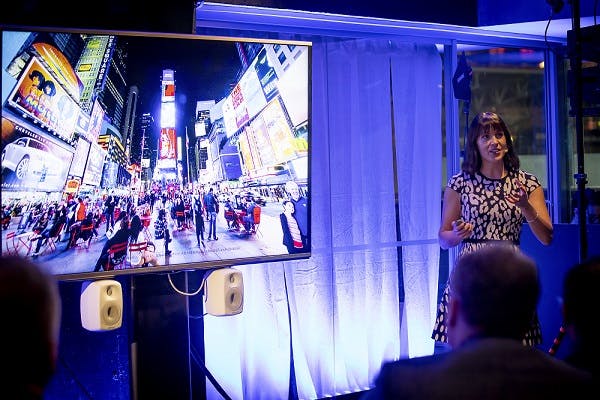
“While change itself is not inherently bad, the lack of information and models on which to navigate a state of uncertainty can cause problems”, according to cognitive neuroscientist Katri Saarikivi. Photo: Markku Pihlaja
Change is constant in our environment. Predicting the future has never been as difficult as it is now. The scale of problems we as humanity face can feel insurmountable. But we have no other alternative but to navigate the uncertain waters the best we can.
Held on a bright winter’s day at HJK's home stadium, Bolt Arena, the HCLTech Finland Future Arena set to tackle the future from three vantage points: that of neuroscientist Katri Saarikivi, white hat hacker Benjamin Särkkä, and football club HJK's CEO Aki Riihilahti and Assistant Captain, defender Mimmi Nurmela. They offered the participants their best tips for navigating and succeeding in the uncertain future.
Uncertainty activates fear and anxiety – the solution is to embrace criticism and curiosity
While change itself is not inherently bad, the lack of information and models on which to navigate a state of uncertainty can cause problems. Uncertainty about the future then activates brain areas related to meaning, anxiety, and fear – states most, if not all, people want to avoid.
So why does uncertainty stress us out? According to cognitive neuroscientist Katri Saarikivi, it's dependent on the locus of control – whether you are in control or whether the locus of control is outside of you. "When the locus is outside, we stress. To the extent that, nobody panics when things go according to plan. Even if the plan is horrifying," Saarikivi quips, quoting the fictional character of Joker in Christopher Nolan's movie, The Dark Knight. Put simply: if we feel we don't have control over a specific factor that affects us, this results in stress.
When we stress too much, we retort to reflexive thinking when the rational road requires reflective. Reflexive thinking allows us to examine our thoughts and feelings and find a solution through those; reflective includes pausing and analyzing the decision about to be made.
According to Saarikivi, rationality is rather a new thing for humankind. Instead, biases are prevalent in human thinking. Biases manifest, for instance, through a confirmation bias – the tendency to interpret information in a way that confirms or supports one's prior beliefs or values – or in the illusory truth effect – the tendency to believe false information to be correct after repeated exposure. In essence, this means that information is not neutral in the human brain. Instead, it is perceived through the lens of values. This can lead to problems in situations of change.
All hope is not lost, though: we can build resilience. The first strategy is accelerating our learning, which is responding to change. We can learn to create new mental models or update existing ones based on novel information.
The second is to remove the obstacles of rationality: stress, groupthink, and the lack of criticism. Groupthink tends to make us less rational and causes a decline in intelligence; stress affects how we process information; criticism challenges us to make sure the information we believe is true.
If we value rational thinking, we must be critical of our beliefs. With these tools, we will be better off in an uncertain future.
The future of cybersecurity – when you can't have it all, what are the choices you need to make?
In the olden days, cybersecurity breaches were a hobby for the few targeting the many, often without any serious malicious intent – rather just because they could and just for laughs. This is no longer the case reminds Benjamin Särkkä, the Director of Cyber Intelligence, Loihde Trust and a white hat hacker.
Data breaches and cyber security attacks are so common that Robert Muller, a former FBI director, has said: I am convinced that there are only two types of companies: those that have been hacked and those that will be. And even they are converging into one category: companies that have been hacked and will be hacked again."
The truth is that humans are responsible for all breaches, whether through negligence, accidental compromise, or malicious actors. It's a factor we cannot get rid of.
How can we then counter those threats in the unknown future? According to Särkkä, threat intelligence, i.e., evidence-based information about cyber-attacks that cyber security experts organize and analyze, is two of the three following: Actionable, Timely, and Accurate.
Unfortunately, no system can have all of them at the same time. You need to make compromises and prioritize. Särkkä recommends The Electronic Frontier Foundation's 5-question threat model for asking the right questions to build on the organization's capacity:
- What do you want to protect?
- Who do you want to protect it from?
- How likely is it that you will need to protect it?
- How bad are the consequences if you fail?
- How much trouble are you willing to go through to try to prevent those?
Going for future excellence: focusing on strengths
Back in the early 2000's Helsinki Football Club, HJK was in a different place than it wanted to be. It had little success on and off the pitch and ten years of bad economic record. To change the course, HJK set a goal to be the leading Nordic football club.
"The way we saw it was that excellence is about choices. We chose to focus on the essentials and play to and invest in our strengths. But you must keep in mind that you always play the long game. If you play the short game, you might compromise excellence and lose your competitive advantage. The way to come out on top is to find your team's strengths," said Aki Riihilahti, CEO of HJK.
HJK decided to look for inspiration outside of its field, not compare itself to other football clubs. "We wanted to be more than a club. Luckily football is a conservative industry, so it was fairly easy to stand out," Riihilahti claims.
One practical step in expanding outside of sport was to offer work welfare services. Inventive as it may be, the strategy was not just a random gamble. "We base everything on data", Riihilahti stresses. The road less travelled paid off. He continues: "Right now, we are the only club in Europe that is profitable – and with a high margin."
Attracting and retaining talent in teams is similar to your ordinary workplace, according to Aki Riihilahti.
"We've experienced that talents don't necessarily need the biggest paycheck, but they need to feel important. What talent needs is enough of a challenge and people who can help you to get ahead and make them feel important."
Supporting future excellence with modern leadership
Picking up on that thought, another part of the equation is investing in the players. As HJK Women's Assistant Captain, defender Mimmi Nurmela stated: "A club is nothing without a working team."
What that needs to be supported by its modern leadership – a philosophy that Nurmela lives by. "You must commit to a common goal, shared values, the right working mentality, honesty, joy, and openness. We communicate our goals and tactics as a team and discuss who we want to be. We always need to step up the game and be better."
A good leader can take on hard issues, but the starting point is trust.
"In every team, there will be conflicts, and we need to confront those conflicts so that we can develop. Everything is based on trust. When giving out critique, the message should be I believe in you, and I know that you can do better, so let's fix this," Nurmela says.
For her, modern leadership means leading in a way that is humane, meaningful, demanding, supportive, and dialogical. "We all want to be a part of something. The duty of the leader is to give everyone meaning. This can be done through one-on-one conversations, offering support but also having expectations and finding the right balance between them. Sometimes you need to be tough to get results, but this needs to be balanced with giving out praise."
A modern leader fails, and it's okay.
"It is good to remember that you, as a leader, cannot be perfect. You can have feelings too. If you don't make mistakes, you are not trying hard enough."
Managing uncertainty is about agility in the face of changes
Managing change in an uncertain future can feel like a mission impossible.
“It is vital to have a pragmatic, efficient, and agile approach to build business resilience in an unprecedentedly unpredictable future”, says Deepak Arora, Head of Nordics, Financial Services at HCLTech.
Picking up from the lessons learned at the HCLTech Future Arena, successful companies need to enable learning, facilitate space for critical thinking, make strategic and informed choices in the uncertain cyber environment, focus on their strengths, and engage in modern leadership.
"We're happy to see that on reflection, we are already on the right track at HCLTech on many of those recommendations and working with our clients to ensure that they too have the tools to succeed now and in the future", concludes Gavin Westwood, Senior Vice President at HCLTech.


